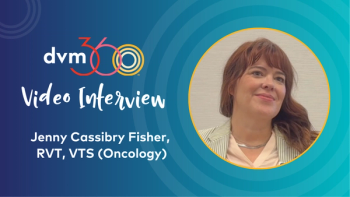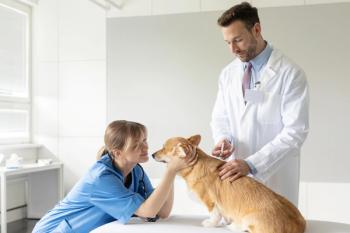
Fallout from a malpractice case
For more than a decade, I've practiced emergency medicine in small metropolitan emergency clinics. According to several colleagues, I practice good medicine and am a competent surgeon. Although I haven't reached a point in my career where I feel like I am an excellent veterinarian, I'm usually competent. Despite all this, I messed up. But, under the same circumstances, I believe this episode could have happened to almost anyone. Here's how my story unfolded:
By Authors name withheld upon request
For more than a decade, Ive practiced emergency medicine in small metropolitan emergency clinics. According to several colleagues, I practice good medicine and am a competent surgeon. Although I havent reached a point in my career where I feel like I am an excellent veterinarian, Im usually competent. Despite all this, I messed up. But, under the same circumstances, I believe this episode could have happened to almost anyone. Heres how my story unfolded:
Early one Sunday, a woman brought an English bulldog with dystocia to the practice. She was a breeder who demanded that everything be done her way, and she maligned her current and previous veterinarians for not being available. The owner had been manipulating the dogs vaginal canal for several hours. The entire vulva was purple, edematous, and torn dorsally. The perivulvar cellulitis was so severe that it was clear that no puppies were likely to pass vaginally.
After negotiating with the client about my treatment recommendation and our fees, I agreed to perform a cesarean section without preoperative radiographs and with only a packed-cell volume test and total solids for preanesthesia workup. Against my better judgment, one technician and I delivered 10 puppies and completed the surgery without any apparent complications. We resuscitated the puppies and gave them to the pet owner.
The owner demanded that we remove the bitchs intravenous catheter for transport home, despite my recommendations to keep the bitch and puppies hospitalized. After much further conflict over payment for services rendered, the client left.
The following day the clients new veterinarian called and chastised me for sending the dogs home after the surgery. Apparently, two puppies had died at home and the bitch passed a dead puppy vaginally while the client was on her way to this new veterinarian.
I couldnt be sure whether the client was telling the truth about the puppy that passed vaginally. We hadnt performed radiographs, I was unable to do a vaginal exam during the initial physical, and I didnt check the vaginal vault while the bitch was under anesthesia.
At the urging of her new veterinarian, the client threatened to sue for the death of the puppies, among other things. My malpractice insurance company settled with the owner.
I was devastated by the mistakes I made with this caseand that this client hated me, even though I changed everything I normally recommend for a dystocia to appease her. Now a local colleague, whom Id never even met, hated me because of what I did, and he told several area veterinarians that I was completely incompetent as a result.
I was certain the entire practice team and shareholders of the emergency clinic I worked at knew I was incompetent. And I truly felt that all of my local colleagues viewed me with suspicion from that day on. I was the veterinarian who left a dead puppy in the vaginal vault when performing a caesarean section. What kind of incompetent fool makes such a mistake?
I proceeded to go through all the classic stages of griefsadness, anger, depression, guilt, helplessness, and resentment. I became increasingly withdrawn, began looking for a position in a new community, and developed a paranoid approach to colleagues, clients, and paraprofessional staff members.
Some people might assume I was grieving the lost puppy and felt more responsible than usual for this patients death because I had made such an obvious, public mistake. I was convinced, however, that the puppy wouldnt have survived no matter what. Ive since come to understand that I was grieving the loss of my self-respect.
Moving on
Despite the wealth of information Id been exposed to on pet loss and client grieving, I was unprepared to deal with my own loss and grieving. And I found that my colleagues and the other people close to me were also unprepared or uninterested.
For a year, I tried to ignore my psychological problems, and I left the clinic where this incident occurred. Eventually, I focused on bettering myself as a veterinarian and making changes to prevent similar occurrences in the future. While I dont consider myself completely recovered from the depression that this case triggered, I can speak confidently about the mistakes I could have avoided.
The most obvious mistake I made was forgetting to examine the birth canal while the bitch was under anesthesia. While it may seem difficult to miss a puppy in the birth canal, this one supposedly missed my detection despite thorough abdominal exploratory and wasnt obviously protruding from the edematous distal birth canal. Unfortunately, because I felt pressure to close quickly and assist the only technician on duty with me, I wasnt as thorough as I should have been.
No matter what the time constraints and staffing limitations were, I should have assured the health of the bitch. Likewise, because equipment and staff were limited, I should have changed my treatment plans to reflect the limitations. For example, I could have waited for more staffing, and I should have disclosed such limitations to the client.
The next mistake I made was not sticking to established medical standards that protect the health of the patient. Sometimes, in an effort to placate clients, Ive agreed to treatment and diagnostic workups that potentially jeopardize the patients well-being. Omitting radiographs, preanesthestic blood work, and normal postoperative care and monitoring was clearly not in this bitchs best interest.
There is nothing in the veterinary oath about putting client wishes before the welfare of the pet. And clients will always be happy if you do things their wayas long as the outcome is positive. But if theres a negative outcome, the client almost never tempers his anger with the realization that you suggested a different treatment.
Next, I learned that keeping good medical records is critical in this era of increased litigation and scrutiny. I didnt document that the client declined several recommendations. Had I done so, the clients next veterinarian may have understood better what transpired, and the client may not have felt she could attack me so aggressively.
In the aftermath of this case I learned a lot about the colleagues I worked for and the people around me. An employer who will stand by you in times of success and failure is invaluable. Furthermore, developing a network of colleagues you can trust to provide support during difficult times is critical to surviving some of the stresses inherent in our profession.
I find that veterinarians can, at times, be quick to judge their colleagues. And I learned the hard way that its important to be tolerant of others mistakes. Extenuating circumstances often come into play, and you may end up in the shoes of the veterinarian youre criticizing at some point in your career.
I now practice medicine differently and feel Im a better veterinarian. Im a pet advocate before anything else. If other options are elected, I document my original recommendation. I try to maintain complete medical records. Im careful not to judge other veterinarians, and Ive been working on developing a network of trusted colleagues I can turn to when I have difficulties.
Despite this hurdle in my life, Ive accomplished several key goals: Im now an ABVP diplomate, Im building a new hospital with a trusted colleague, and I have learned to focus more on my successes. I have survived.
Newsletter
From exam room tips to practice management insights, get trusted veterinary news delivered straight to your inbox—subscribe to dvm360.





